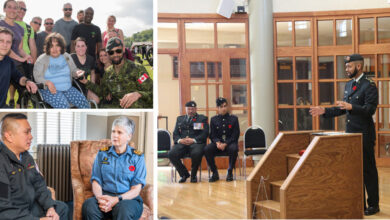Helpful Resources
Preparing for College or University Made Easy
It’s never too early to prepare for the upcoming school year, particularly if attending college or university this September.
There are a few simple things military families can do to ensure this transitional school year is a successful and productive one for everyone.
“We want students to love being at school, feel engaged, and comfortable enough to take it to the next level. There is no perfect checklist. Just a few pieces of advice to consider,” said Sandra Heron, Manager of Student Retention, Algonquin College, Ottawa, Ontario.
Transitioning from high school to a post-secondary institution isn’t easy. Parents, instructors and professors place high expectations on students.
“Parents can get caught up in the logistics of finances, accommodations, and academics. They should take a moment to acknowledge how they feel about this transitional time, about their child heading off to college. You cannot shove 18 years of sex education, budgeting and responsibility into a couple of days before school begins. Believe that you have invested in your learner already. Don’t panic,” said Heron.
Students should get their rooms prepared in advance. Unlike high school, college and university workload drops into your lap on the first day of class. There is no time to go shopping for decor items.
Along with basic office supplies for your desk students will also need storage containers of every shape and colour for the desk, under the bed and in the closet. You can have a lot of things packed long before summer ends.
“Don’t forget to pack whatever brings you comfort. A reminder, or a comfort from home like a teddy bear. Accept that this is a big change,” said Heron.
Students should make the effort to try and get a copy of their program’s syllabus. It may be available on-line. This will give the students the opportunity to plan their semester accordingly. They can insert all the critical dates for the semester such as assignments, exams, scheduled labs and due dates in to their calendar, or maybe the family calendar.
For students who have a part-time job or on a school sports team, each syllabus is worth its weight in gold as they can plan their study hours accordingly. If they are having a difficult time finding out what their year will look like they can seek out an academic advisor. The advisor can help students discover what their responsibilities will be to each class.
“There are resources everywhere you turn on campuses today. To make a successful transition make sure you are taking care of yourself. This is a time to reach out for help. Each time you reach out you enhance your chances of having a great school year,” said Heron. “Campuses are working to see student success.”
It’s best for students to be organized and prepared for the changes that are coming their way. While going to school attending classes, handing in assignments and studying for exams is their new full-time job. Heron suggests setting some serious goals to see what can be accomplished.
“There is no substitution for showing up to class. Set the goal of making it to your classes. Set the goal of joining something on campus. Anything, just join something. Find a place where you fit in, where you feel like you belong,” said Heron.
Follow the SMART goal format and make your goals specific, measurable, attainable, relevant and time-bound.
Be specific about your goals. What GPA do you want to achieve? How many hours will you commit to spending in the library studying each week? Are you going to join clubs, get a job, commit to volunteer work? Grades aren’t the only thing you can make goals about.
This is the start of the next stage of students and their family’s life. Remember, anything is possible if yo put your mind to it.
To learn more about Algonquin College’s programs and services please visit their website.
Get More! Receive six issues of Canadian Military Family Magazine in your mail box for only $17.95! Click here to subscribe NOW!










